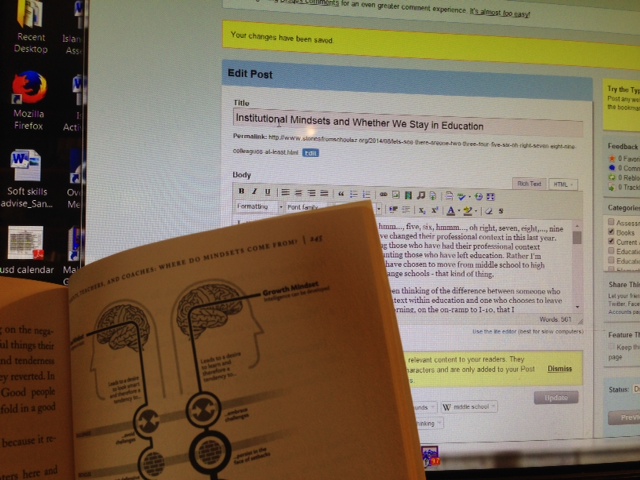Let’s see, there are one, two, three, four, hmm…, five, six, hmmm…, oh right, seven, eight,…, nine colleagues, at least, including me, who have changed their professional context in this last year.
I’m not counting those who have had their professional context changed against their wishes. Nor am I counting those who have left education all together. Rather I’m thinking, for example, about teachers who have chosen to move from middle school to high school, or administrators who wanted to change schools – that kind of thing.
And in my recent drive time musings, I’ve been thinking of the difference between someone who chooses to change his or her professional context within education and one who chooses to completely leave education. Then yesterday morning, on the on-ramp to I-10, I remembered reading Mindset: The Psychology of Success, by Carol Dweck, with last year’s cohort of teacherpreneurs.
Drucker distinguishes between growth mindsets and fixed mindsets.
In a growth mindset, “Intelligence can be developed,” which:
Leads to a desire to learn and therefore a tendency to…embrace challenges…persist in the face of setbacks…see efforts as a path to mastery…learn from criticism…find lessons and inspiration in the success of others.
As a result they reach ever-higher levels of achievement.
But in a fixed mindset, “Intelligence is static,” which:
Leads to a desire to look smart and therefore a tendency to…avoid challenges…get defensive or give up early…see effort as fruitless or worse…ignore useful negative feedback…feel threatened by the success of others.
As a result they may plateau early and achieve less than their full potential.
Now, please don’t jump to the conclusion that I’m going to opine that those who change their jobs but stay in the profession have growth mindsets and that those who leave have fixed mindsets. Rather, I’m going to speculate that individual schools and districts and departments inadvertantly develop their own institutional mindsets.
But it makes some sense. Say you start your career in a school with a teacher-oriented principal who rewards risk taking and penalizes opacity. You’re more likely to assume that that’s the state of the profession and pursue new challenges within education. But if you work in a school with an insecure principal who blocks teacher led initiatives and punishes setbacks, you could well conclude that that’s the profession-wide status quo and pursue achievement in a different field.
Maybe growth mindest colleagues stay in education as long as they find an institutional growth mindset whenever they pursue a new challenge, but leave education when they encounter a fixed mindset. It sounds like a twist on the Peter Principal.
By the time I was thinking that, I’d passed downtown and exited on 22nd. I arrived at school with lots more unanswered questions – where does an institutional mindset come from? How long does it take to form? How can a fixed institutional mindset be changed and how long does that take? Maybe like attracts like and fixed mindset employees tend to find fixed mindset institutions while their growth mindset colleagues accumulate elsewhere – thus segregating themselves in institutions destined to either stagnate or grow.
I’m glad we’re at the beginning of the school year because it’s going to take a lot of driving to sort it all out.










Comments 4
Loved this! Now you have me thinking about how to apply the mindsets idea to organizations and institutions. In my district we have had a huge amount of movement as well. Some are reacting by asking, “What’s wrong?” But depending in the change and the reason behind the move, couldn’t change signify a healthy environment where people feel confident tackling new challenges and moving to innovate? Some great thoughts.
Side Note: I think Mindsets research was published by Carol Dweck, not Drucker!
Yes, I agree, Carol Dweck, not Drucker.
It has crossed my mind that perhaps the majority of teachers are growth mindset people and the majority of politicians are fixed mindset people. I think that’s why there’s so much disagreement about what “success” should look like. Growth mindset people are much more interested in long term effects–not just the next election cycle. For a fixed mindset person, it is terribly important to appear smart all the time.
B and Brianna, thanks for your comments and the correction. I don’t know where the Drecker came from I had the book right in front of me.
That’s an interesting point about politicians being fixed minded – it certainly explains a lot. Our school has had a lot of turn over in the past couple of years. I’d say it’s definitely a growth minded institution full of growth minded professionals. So the result is the turn-over is generally for positive reasons and not so disruptive.
I’m still trying to figure out where Drucker came from – I’ve never read anything by him.
Thank you for reminding me about Carol Dweck’s amazing work!